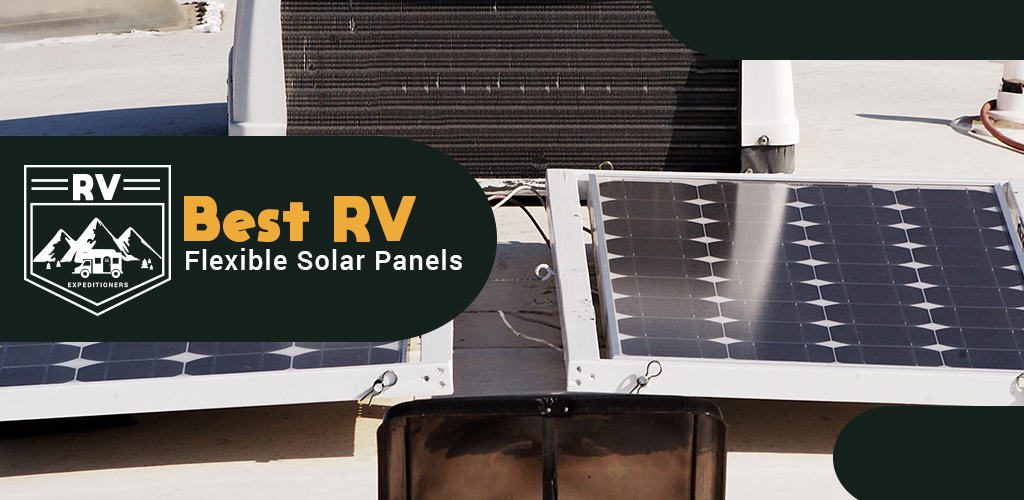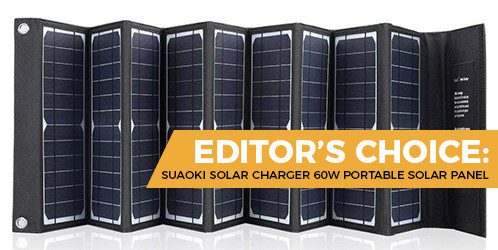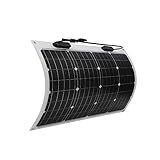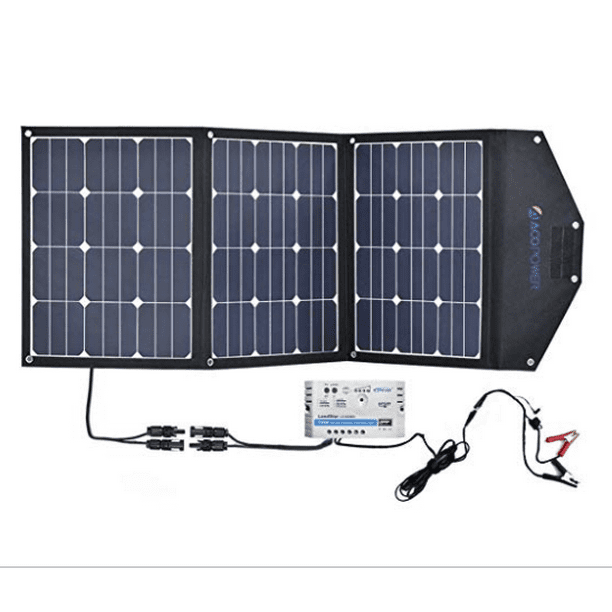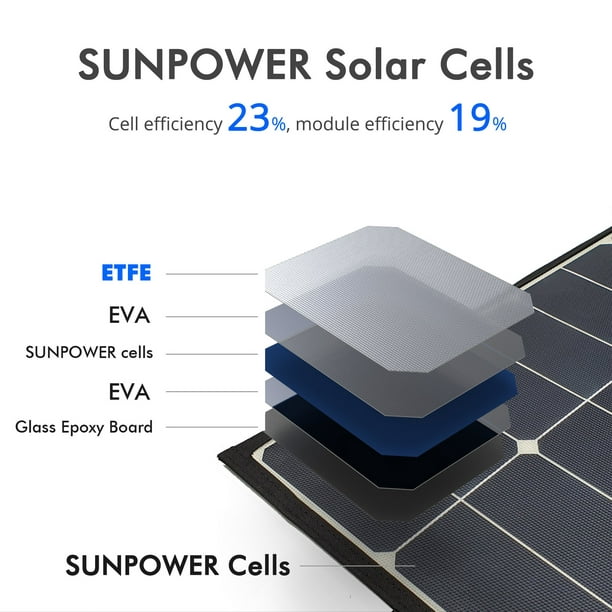When living the RV life, one thing that you always have to think about is power.
Since you aren’t always guaranteed to have an outlet to plug into, it’s necessary to bring as much energy as possible with you so that you can still use everything inside your mobile home.
Fortunately, solar technology has advanced to the point where you can attach flexible panels to the roof of your RV, saving you the headache of having to bring extra batteries wherever you go.
Today we’re going to look at some of the best flexible solar panels, as well as go over how to determine your power needs, as well as how to utilize your power source as efficiently as possible.
Although you probably can’t become 100% self-sufficient, it’s about as close as you can get.
COMPARISON CHART
| IMAGE | PRODUCT | |
|---|---|---|
 | 1. Renogy Flexible Solar Panel 50 Watt 12 Volt Monocrystalline
| LEARN MORE ► |
 | 2. SunPower 50 Watt Flexible Monocrystalline High Efficiency Solar Panel
| LEARN MORE ► |
3. ACOPOWER 120W Portable Solar Panel
| LEARN MORE ► | |
4. Flexible Solar Panels 55 Watt 12 Volt
| LEARN MORE ► | |
5. TP-solar Flexible Solar Panel 50W 24V/12V Monocrystalline Bendable
| LEARN MORE ► |
OUR TOP 5 PICKS
#1 Renogy Flexible Solar Panel 50 Watt 12 Volt

Specifications
Material | Glass |
Item Dimensions LxWxH | 26.5 x 20 x 0.16 inches |
Style | Solar Panel |
Features
The Renogy 50W Flexible Solar Panel is the perfect way to power your marine or RV needs. With a traditional solar panel, you are often bound by its rigidness and heavy weight. But with the Renogy 50W Flexible Solar Panel, you get all of the power with none of the hassle.
- WHAT WE DON’T LIKE
- PROS/CONS OVERVIEW
This panel is thin and highly flexible, and can be installed on curved surfaces. The panel is also capable of flexing up to 248 degrees. At only 2.87 pounds, this lightweight solar panel is a quarter of the weight of its traditional 50W counterpart. This makes it easy to transport and install. The Renogy 50W Flexible Solar Panel is also perfect for other various applications, including providing power on a boat or teardrop trailer.
#2 SunPower 50 Watt Flexible Monocrystalline High Efficiency Solar Panel

Specifications
Material | 40.2 x 1.2 x 26.4 inches |
Item Dimensions LxWxH | 19 pounds |
Efficiency | High Efficiency |
Included Components | SUNLOK Micro Junction Box & PV4-S connectors |
Features
If you're looking for a flexible solar panel that can be stowed away when not in use, this is the product. Made by Sunpower and designed with high efficiency at 23% - it will produce more power than its counterparts while taking up less space!
- WHAT WE DON’T LIKE
- PROS/CONS OVERVIEW
With an output of 50 watts, this panel is designed to produce more power than its counterparts while taking up less space. The micro junction box has IP67 protection, making it resistant to weather and wear and tear. Plus, it's lightweight and portable, making it easy to stow away when not in use. So whether you're taking a cross-country road trip or spending a weekend at the beach, you can rest assured that your SunPower solar panel will keep you powered up and ready to go.
#3 ACOPOWER 120W Portable Solar Panel
Specifications
Product Dimensions | 23.7 x 18.2 x 1.9 inches |
Item Weight | 8.95 pounds |
Manufacturer | ACOPOWER |
Features
Next, we have another folding panel that is designed for portable deployment. However, if you’re looking for something a bit more industrial that can charge your RV batteries, this model is going to be a better option. Let’s see what it can do.
120-Watt Output
Overall, when comparing different solar panels, the wattage is going to be one of the most crucial elements to consider. In this case, a peak delivery of 120 watts is more than sufficient for most charging needs.
That being said, you have to realize that this number is based on maximum sunlight, so if you’re in a cloudy area or it’s winter, then you won’t be able to get the same amount of power.
Fortunately, this panel comes with a meter gauge to tell you how much energy you’re producing so that you can plan accordingly.
Folding Design
Although this is another portable solar panel, one feature that makes it a little easier to use is the fact that it comes with folding feet. This way, you can prop it up outside and collect sunlight that much easier. I don’t recommend mounting this unit.
- WHAT WE DON’T LIKE
- PROS/CONS OVERVIEW
When looking at portable solar panels, this is one of the most powerful. I also like that it comes with alligator clips so that you can charge your battery directly if necessary.
Video
#4Flexible Solar Panels 55 Watt 12 Volt
Specifications
Material | Allto Solar |
Item Dimensions LxWxH | 26.77 x 19.68 x 0.08 inches |
Efficiency | High Efficiency |
Features
Introducing the Flexible Solar Panel – the perfect solution for those who want to take advantage of solar power, but have struggled with traditional, rigid panels in the past. This innovative panel is designed to be installed easily on curved or uneven surfaces, making it ideal for use on RVs, boats, and trailers.
- WHAT WE DON’T LIKE
- PROS/CONS OVERVIEW
The Flexible Solar Panels 55 Watt 12 Volt are designed to be convenient and easy to install on a variety of surfaces. These panels are perfect for those who want to take advantage of solar energy but don't want the hassle of traditional, rigid solar panels. The panels can be bent up to 30 degrees, making them ideal for installation on curved surfaces like the roof of an RV or boat. They're also great for off-grid systems like RVs, yachts, and cabins. The panels come with all necessary hardware and instructions for installation. With a little bit of effort, you can have these panels up and running in no time, providing clean, renewable energy for your home or business.
#5 TP-solar Flexible Solar Panel 50W 24V/12V Monocrystalline Bendable
Specifications
Material | Monocrystalline Silicon |
Item Weight | 3.97 Pounds |
Efficiency | High Efficiency |
Style | Battery |
Peak Power | 50Watt |
Power Tolerance Range | ±5% |
Open Circuit Voltage | 28.1V |
Max Power Voltage | 24.2 |
Short Circuit Current | 2.3A |
Max Power Current | 2.1A |
Features
TP-solar's Flexible Solar Panel is perfect for those who want to harness the power of the sun on the go. Its bendable design means it can be mounted on any irregular surface, making it ideal for RVs, boats, and even cars. With a conversion efficiency of up to 50%, this panel is sure to give you a boost when you need it most.
- WHAT WE DON’T LIKE
- PROS/CONS OVERVIEW
This monocrystalline solar panel is made with unique back contact technology, which allows for increased conversion efficiency of up to 50%. That means more power for your 12-volt battery charging needs! Plus, multiple panels can be connected in series to charge 24/48 volt batteries.
BUYER'S GUIDE
How Much Solar Should Your RV Have?
Answering this question is going to vary based on a variety of factors, but the most vital is how much energy you’ll be using in your rig. While you won’t be able to run entirely off of solar power, you can determine a sufficient amount based on the kind of appliances that you have and that will factor what the best flexible solar panel to use.
The first thing to do will be to conduct an energy audit of your mobile home to calculate how much electricity you use on a regular basis. Let’s go over how to do that.
Conducting an Energy Audit
One of the easiest ways to figure out your energy needs for your RV is to pay attention to the appliances you have in your rig. To do that, you can look at the manual or the sticker attached to it.
You’ll notice that electricity is labeled in a few different ways - watts, amps, and voltage. Let’s break down each one.
Watts - the energy produced by your source (i.e., your batteries)
Amps - the flow of energy from the source
Volts - the amount of resistance in an electrical system
To break it down even further, think of it like this. Amps determine how much power you’re going to get, and volts are how you can convert that energy into watts. Thus, converting amps into wattage goes like this:
Number of Amps x Number of Volts = Wattage
If you’re drawing 10 amps from your batteries and you’re using a 120-volt system, then you can produce up to 1,200 watts.
So, when you calculate the total number of watts used by your appliances and machinery in your RV, then you can determine how many amps you need as a result.
For example, if you require 2,200 watts total, and you know that you’re using a 110-volt system, then you need to produce at least 20 amps at any given time. I would suggest going a little over that though just so that you have a buffer.
Sizing Your Charge Controller
The first question you’ll invariably ask here is “what is a charge controller?” Simply put, this is a device that prevents your batteries from getting overcharged by your solar panels. If too much power goes into the cell, then it could cause it to break down.
Because you want to be able to regulate the power going from a panel to the battery, you need to pick the right size controller for your system. A good formula to follow is this:
The number of panels x wattage output, divide that by the voltage of your batteries and then add 25% for cold weather. Also, be sure to round up so that you get even more of a buffer.
So, for example, let’s say that you have three panels that give you 100 watts each. That’s 300 watts, divided by a 12-volt battery (25 amps). Adding in 25% gives you 31.25, so you should round up to 32 (or higher) for your charge controller.
Sizing Your RV Flexible Panel Array
One challenge that you’ll discover when installing solar panels onto your rig is that you have limited space to do it. The first obvious choice is the roof, but you can also install panels onto the sides of your mobile home as well.
The downside of installing them on one side is that you limit the amount of solar energy you can get, but it offers more real estate, so it may be a suitable solution if you need more power.
Overall, the best way to size your panel array is to determine how many of them you need to keep your batteries charged regularly. Also, keep in mind that your alternator from the engine is already charging them, so if you drive most of the time, you probably don’t need that many panels.
Once you get your total number of watts necessary, then try to find panels that offer as many watts as possible. Keep in mind, however, that peak wattage is almost never going to happen, so you have to plan on only getting about 70% of that.
So, for example, if you find a panel that delivers 150 peak watts, you can expect to receive 105 of them in reality. Even though you may get a little more than that, it’s always better to be conservative with your estimates.
If you need 800 watts to power your batteries, then four of those panels will be ideal. However, depending on the available space on your RV, as well as the cost per panel, you may or may not be able to get all four of them.
How Many Amp-Hours Is Your Battery Bank?
Another thing to consider is the number of amp hours that you have total in your battery bank. Experts recommend only utilizing about half of that number to extend battery life, so keep that in mind when calculating your needs.
When looking at amp hours, you’ll notice that they can vary based on the number of volts. Deep-cycle batteries (like the ones you use for appliances) will have several hundred amp hours, so let’s say that your current bank delivers 800 amp-hours. Based on the recommendation, you should only plan on using 400 of them.
This estimate will help you determine how much power you have at any given time, as well as how much energy you should be using to recharge those batteries.
CONCLUSION
Because solar panels are all about efficiency and reliability, I highly recommend the Renogy Flexible Solar Panel 50 Watt 12 Volt among the list of our best flexible solar panels. Although it only produces 60 watts of peak power, it’s one of the most reliable and easy to use panels on the market.
This panel has a high-efficiency design, so you can utilize it for a variety of needs, particularly for electronics. Having a few of these on your rig will keep you well-powered for years to come.

